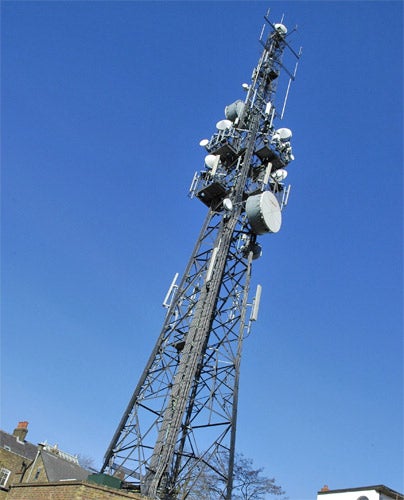Study finds no link between phone masts and childhood cancers

Pregnant women living close to mobile-phone base stations are at no greater risk of having children who develop cancer, researchers have found.
The first study to examine the effects of the 81,000 phone masts across Britain on mothers-to-be has found no link with early childhood cancers such as leukaemia, which is thought to be triggered in the womb, and brain tumours. The study, by researchers at Imperial College, London, is the most detailed yet of the claimed link between phone masts and childhood cancer.
Reports of clusters of cancer cases among families living close to the masts led to demands that the masts be moved. But the numbers involved have been too small, and the risks of a biased selection of cases too high, to draw firm conclusions. Paul Elliott, professor of epidemiology and public health medicine, said the big advantage of the new study was that it was nationwide and not focused on areas where there was concern about cancer risk.
"We looked at the exposure of the child at the birth address and nine months before," he said. "So we were effectively looking at the exposure of the foetus. Within the limitations of the study, these results are reassuring."
The increase in mobile phone use – from 9 million handsets in 1997 to 74 million in 2007 – has raised worries about the effects of exposure to low-frequency radiation. Several studies, including the Interphone study involving more than 10,000 people from 13 countries that was published last month, have found no damaging health effects from mobile phones themselves.
Public anxiety about transmitters has grown despite the level of individual exposure from transmitters being much lower than from mobile phones.
For the study, Professor Elliott and colleagues identified almost 1,400 children aged up to four who were registered with leukaemia or a brain or nervous-system tumour between 1999 and 2001. Then the distance of each patient's birth address from the nearest base station was estimated.
The authors admit the study examined only early childhood cancer and not other potential health effects said to be linked with mobile phones. However they concluded: "The results of our study should help to place any future reports of cancer clusters near mobile-phone base stations in a wider public-health context." John Bithell, of the Childhood Cancer Research Group at the University of Oxford, said doctors should reassure parents not to worry about the masts.
"Moving away from a mast, with all its stresses and costs, cannot be justified on health grounds in the light of the current evidence," he said. There was also no evidence that has shown any biological effects of mobile phone radiation that "might lead us to worry about its health effects," he added.
The radio waves produced by mobile phones are non-ionising, unlike ionising X-rays which are known to cause cancer. They are also not strong enough to damage DNA molecules. So there is no known mechanism according to which mobile phone radiation can cause brain tumours.
The study, published in the British Medical Journal, is the latest to exonerate mobile phones, and the masts that transmit their signals, of health damaging effects. But researchers cannot prove a negative, and say that there is no evidence of a cancer risk.
It remains possible that future studies, conducted over a longer period or in a different way, may reveal a hitherto unsuspected danger. One limitation is that mobile phones have only been in mass use for about 15 years.
Mobile phones: Myth & reality
* The biggest risk posed by mobile phones is to people driving cars who may be distracted by them, even if they are using the devices in hands-free mode.
* There is no reason to suppose that mobile phones have any adverse effects. But children are more vulnerable to agents such as cigarette smoke, lead and radiation and the same could concievably be true of mobile phone signals.
* It is impossible to rule out the possibility that cancer caused by exposure to mobile phones could appear in a few years. Most cancers take longer than 10 years to develop.
* However, there is no evidence to suggest that the use of mobile phones has biological effects on cells. The radio waves produced by the handsets are non-ionising, unlike ionising X-rays which are known to cause cancer.
* Worries about the effects of mobile phones on the brain and on biological processes, indicated in some earlier research, have been tested and found to be baseless.
* The largest and most detailed study yet into the health risks posed by mobile phones – the Interphone study published last month – failed to find a link between the devices and brain cancer.
Join our commenting forum
Join thought-provoking conversations, follow other Independent readers and see their replies
Comments
Bookmark popover
Removed from bookmarks